Pope Benedict’s vision of Catholicism, Vatican II, and the future of the Church endure through his teachings
Pope Emeritus Benedict XVI, who died on Saturday, left behind an extensive body of work examining and diagnosing ills in the Catholic Church.
A theological and spiritual giant to many, Benedict’s reflections on the Catholic Church are a roadmap for many seeking to keep the nearly 2,000-year-old institution on the correct path.
RETIRED POPE BENEDICT SAYS HE IS IN LAST PHASE OF LIFE, ON ‘PILGRIMAGE HOME’
Benedict’s work is best understood as a long career seeking to guide the Church through uncharted territory. He began his priesthood in the aftermath of two world wars and amid technological, political and sexual revolutions that threatened to overwhelm religion.
Benedict, born Joseph Ratzinger, was a framer of the Second Vatican Council (also known as Vatican II), which began in 1962 and ended in 1965. The council established no new dogmas but attempted to update spiritual disciplines, aesthetics and styles of worship for the modern, globalized Church.
“To me, the key to Benedict is Vatican II,” Bishop Robert Barron of Word on Fire Ministries told Fox News Digital. “He’s a man of the council. He was at the council. He helped to write a lot of these major documents. He helped to explain it to the wider world.”
Changes at Vatican II included dropping the requirement for Masses to be said in Latin, a greater emphasis on church community, and modification of the liturgy to allow greater participation from the pews.
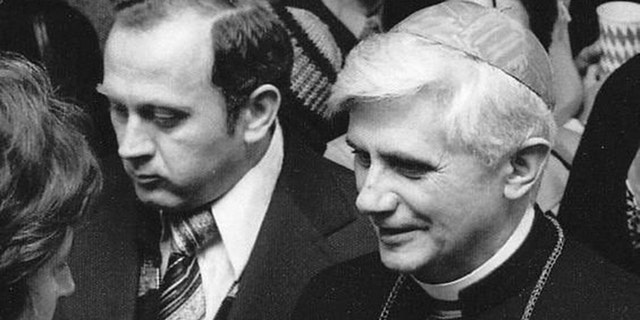
Barron continued, “At the council, he was a liberal because he was opposed to the conservatives who didn’t want a renewal of the council. But then almost immediately after the council, he became wary of Catholic progressivism, which he saw as going beyond the council and compromising Catholic integrity.”
Through decades of defense for Vatican II – coupled with a strict enforcement of religious orthodoxy — Benedict became a spiritual umpire for the Church’s most contested debates.
“[Benedict] had long been worried about the tides of modernity that were threatening the faithful proclamation of Church teaching, but that were also consequently blurring a proper understanding of the human person, the encounter with Jesus Christ, and damaging Catholicism’s ability and mandate to proclaim the Gospel to the ends of the earth,” EWTN Executive Director Matthew Brunson, a biographer of Benedict, told Fox News Digital.
Brunson continued, “An expert at the Second Vatican Council, Ratzinger had shaped one of its key documents, Lumen Gentium, on the Church, and also understood the call of the Council for the Church to enter into a dialogue with the modern world.”
Despite his own commitment to finding spiritual truth, Benedict worried that internal conflicts were opening the Church to compromise.
“Too often, however, Catholic theologians and teachers embraced the relativism of the world, to the great detriment of the Catholic faith and the immense confusion and demoralization of the faithful,” Brunson added.
In 1969, Benedict was still the Rev. Joseph Ratzinger — a professor of theology at University of Regensburg in Germany. While there, he gave a series of lectures about the struggles he believed that the Church would face in the coming decades.
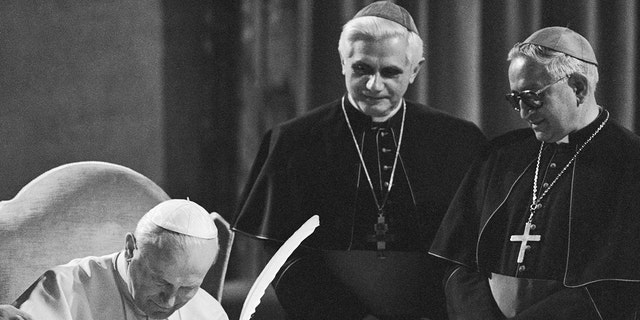
Comparing the modern era to the times of the French Revolution and the Enlightenment, the future pope said in the radio lectures that the Church’s increasing focus on temporal issues was unintentionally causing a decline in theological understanding.
VATICAN PRAISES SUPREME COURT’S ABORTION DECISION, SAYS BEING PRO-LIFE MEANS SUPPORTING OTHER ISSUES AS WELL
While the post-Vatican II Church was growing on paper, he speculated, its diminishing spiritual side was setting it up for a future collapse.
“It will become small and will have to start pretty much all over again,” Ratzinger said in the lectures. “It will no longer have use of the structures it built in its years of prosperity. The reduction in the number of faithful will lead to it losing an important part of its social privileges.”
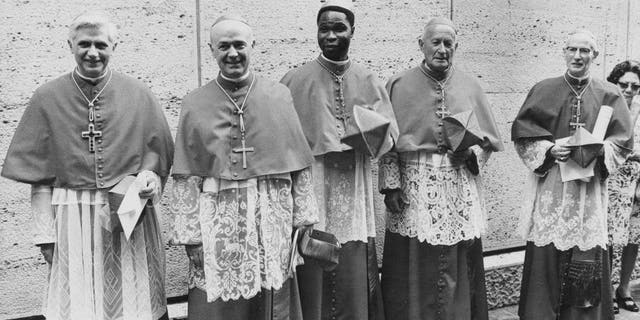
These observations on internal and external struggles of the Church continued well into his post-papacy writing career and continue to influence how many Church leaders contemplate the future.
The Catholic Church is one of the oldest continuously extant institutions in the world at nearly 2,000 years old. The Church claims lineage from the first century A.D. and teaches that it was founded by Jesus Christ at the Pentecost.
MORE THAN 600 CLERGY SEX ABUSE CASES ON FILE AT VATICAN SINCE 2000
It is the largest denomination of Christianity and claims more than 1.3 billion faithful worldwide. It has churches in every country on the planet, including chapels in Antarctica.
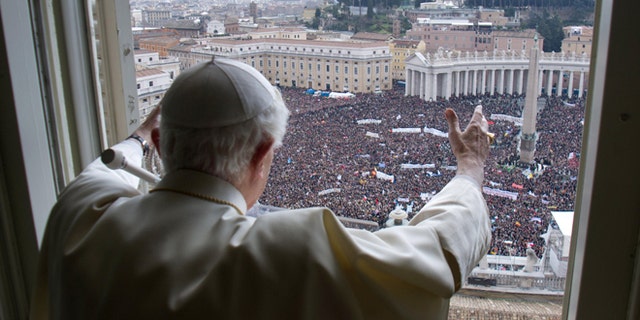
Despite its massive number of adherents, the Catholic Church has in recent decades been plagued by many of the ills that Benedict warned of throughout his life.
Foremost are the cascading ramifications of widespread sex abuse among clergy beginning in the 20th century.
Ratzinger was one of the first leaders in tackling the issue of sexual abuse in the Catholic Church while serving as a cardinal under Pope Saint John Paul II.
U.S. CATHOLIC BISHOPS ELECT TIMOTHY BROGLIO AS NEW PRESIDENT
The cardinal convinced his predecessor to withdraw authority from individual dioceses in relation to abuse claims and instead give jurisdiction to the Congregation for the Doctrine of the Faith.
Critics of Benedict later claimed that he failed to act on four cases of abuse under his jurisdiction while serving as Archbishop of Munich. Benedict apologized for any negligence that allowed the misconduct to go unnoticed, but he vehemently denied any knowing cooperation in ignoring abuse.
Benedict claimed in 2019 that an absence of God from society, the sexual revolution of the swinging ‘60s, and the formation of “homosexual cliques” in seminaries planted the seeds of the sex abuse crisis.
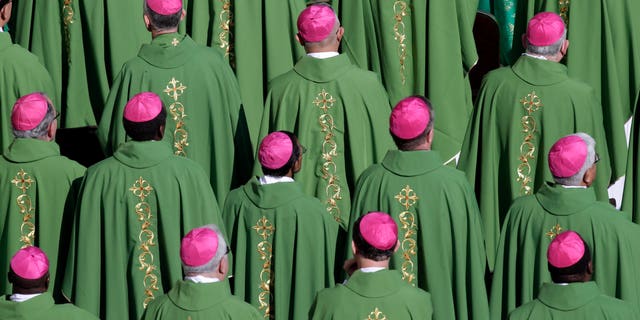
“Why did pedophilia reach such proportions? Ultimately, the reason is the absence of God,” Benedict wrote. “Perhaps it is worth mentioning that in not a few seminaries, students caught reading my books were considered unsuitable for the priesthood. My books were hidden away, like bad literature, and only read under the desk.”
He also blamed a disordered view of the clergy and widespread clericalism for allowing the crisis to evolve within a closed, unquestioned culture.
Benedict said that during the 1980s and 1990s, “the right to a defense [for priests] was so broad as to make a conviction nearly impossible.”
Pope Francis has continued Benedict’s efforts to root out malicious clerics of the Church hierarchy “with the wrath of God,” appointing task forces and establishing victim aid groups.
Still, long-buried accounts of abuse by priests and prelates continue to surface.
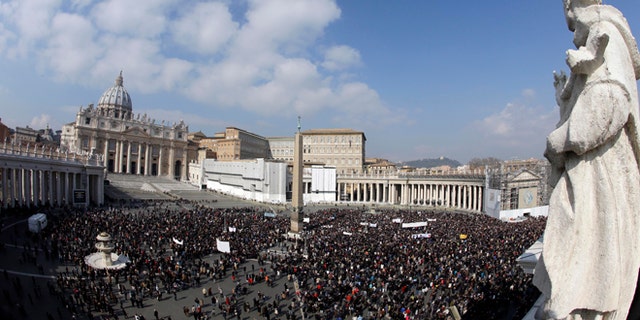
Benedict’s prediction of Church turmoil due to theological confusion and overemphasized focus on temporal issues has been most apparently vindicated in the West.
While the Catholic Church has seen growth in Asia and Africa, it continues to flounder in Western countries with declining church attendance and deep theological confusion.
ATLANTIC OP-ED CLAIMS CATHOLIC ROSARY HAS BECOME ‘AN EXTREMIST SYMBOL’
In 2019, a Pew Research survey found that only one-in-three Catholics understand basic tenants of the Catholic faith concerning the Eucharist.
Catholicism holds that the Eucharist is a central sacrament and the literal body and blood of Christ.
Another Pew Research poll in 2015 found that more than half of Catholics were open to the ordination of women to the priesthood — a concept that is theologically untenable according to Catholic teachings on the nature of the clergy.
This widespread misunderstanding of the religion by its own members has caused increasing confusion on the world stage.
Bishops of the Catholic Church in Germany — one of the wealthiest and most progressive national conferences — have publicly feuded with the Vatican as they have repeatedly tried to alter fundamental dogmas on sexuality and the priesthood.
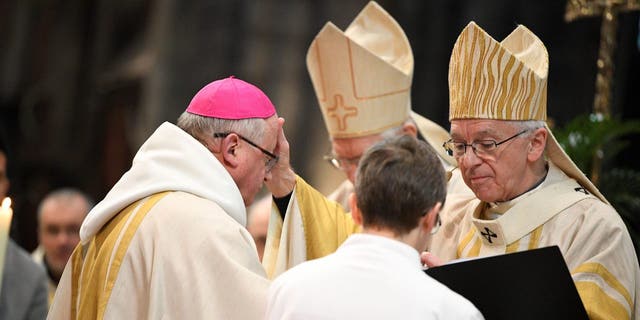
The “Synodal Path” — sometimes called the “Synodal Way” — is a controversial Church committee in Germany. The synod, organized by the German Bishops’ Conference and the Central Committee of German Catholics, aims at discussing and addressing four loose topics: sexual ethics, the structure of Church governance, women’s role in the Church, and the vocation of the priesthood.
Benedict’s forewarned theological crisis has appeared in secular politics as well.
POPE DERIDES BIDEN’S ABORTION VIEWS, CATHOLIC SELF-IDENTITY AS ‘INCOHERENCE’
Catholicism and its doctrine have been hotly debated in U.S. politics since the election of President Joe Biden.
Biden’s Catholic faith and pro-choice policy initiatives have raised eyebrows from even the pope.
Asked about Biden — a self-professed “devout Catholic” who supports blanket legalization of abortion on the federal level — Pope Francis dismissed the president as incomprehensible.
“I leave it to [President Biden’s] conscience and that he speaks to his bishop, his pastor, his parish priest about that incoherence,” the pope remarked.
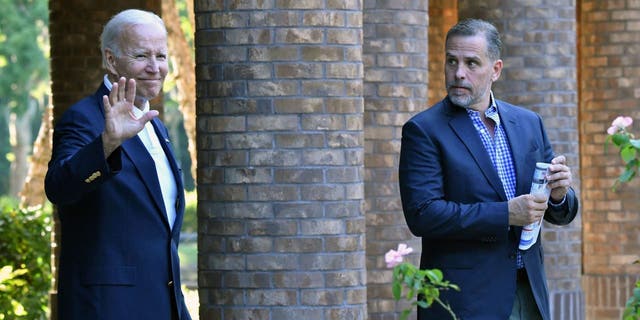
The U.S. Supreme Court has provided stark contrast to Biden on the personal beliefs of Catholics in secular office — most notably after the overturning of Roe v. Wade.
ACTIVISTS LAY OUT PLANS FOR ROE V. WADE PROTESTS OUTSIDE CATHOLIC CHURCHES ON MOTHER’S DAY
Catholics make up the majority of current sitting Supreme Court justices — most of them social conservatives — leading many progressives to warn of a Catholic takeover at the highest levels of the Judicial Branch.
This correlation between Catholic justices and an end to federal protections for abortion caused outrage with many on the Left who accused the court of mixing law and religion.
At the center of Catholicism’s struggle today is Pope Francis, a close friend and great admirer of Benedict who has been both celebrated and admonished from all sides of the increasingly confused Church.
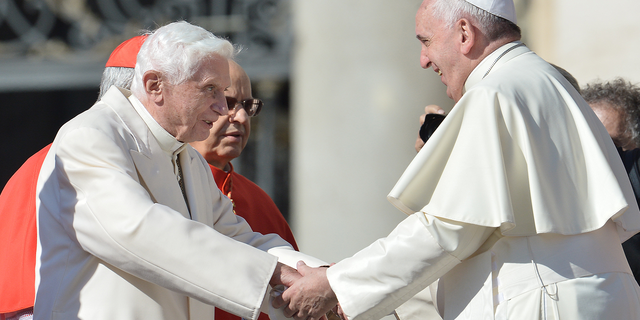
“They’re very different in terms of personality, also in terms of theological formation. Benedict was at the highest level of university academia,” Bishop Barron told Fox News Digital. “Francis is not an academic. Francis speaks much more as a pastor.”
He added, “But in terms of the Vatican II ideas, they’re very much on the same page.”
BISHOP BARRON: ‘DUMBED DOWN CATHOLICISM HAS NOT HELPED EVANGELIZATION’
Pope Francis’s emphasis on tolerance in discussion of LGBT issues has led to accusations from conservatives that he has walked back teachings on Catholic sexual ethics.
Conversely, his continued denial to approve of homosexual marriages and his vocal opposition to abortion have made him unpopular with progressives seeking a more modern Church.
Similar to Benedict, Pope Francis has not been afraid to pick fights with both staunch traditionalists and radical progressives in efforts to enforce Church unity and cohesion.
Under his leadership, the Church has cracked down severely on Latin Mass communities in an effort to squash increasingly separatist movements within the Church.
POPE FRANCIS URGES PARENTS TO ‘NEVER CONDEMN’ THEIR GAY CHILDREN
He similarly has shut down discussion on many social issues that progressives have sought to reform further than what was decided at Vatican II.
In 2019, Pope Francis told a nun asking him to approve the ordination of women that “if the Lord didn’t want a sacramental ministry for women, it can’t go forward,” adding, “We are Catholics, but if anyone wants to found another church they are free [to do so].”
Pope Francis has spoken widely about the need for spiritual discipline, the power of prayer, and the need to remember that the Church’s mission is not in abstract philosophy but in the reality of Jesus Christ.

The pontiff has experienced serious physical problems in recent years. Plagued by health issues, Pope Francis has at times used a wheelchair.
Here, too, Benedict’s decision-making on the Church’s best interests has influenced how Catholic leaders will plan for the future.
POPE BENEDICT XVI’S LAST DAY AS POPE
In February 2013, at 85 years old, Benedict became the first pope in centuries to resign from his post.
“I have come to the certainty that my strengths, due to an advanced age, are no longer suited to an adequate exercise,” he said at that time.
Pope Francis, asked in 2022 if he would resign in the event that he was incapable of fulfilling his role, lauded Benedict’s decision, calling his abdication “a great example” of how to address popes’ longevity in the modern age.
POPE FRANCIS DESCRIBES PRESSURES OF THE PAPACY: ‘SOMETIMES, YOU FEEL YOU ARE NUMB’
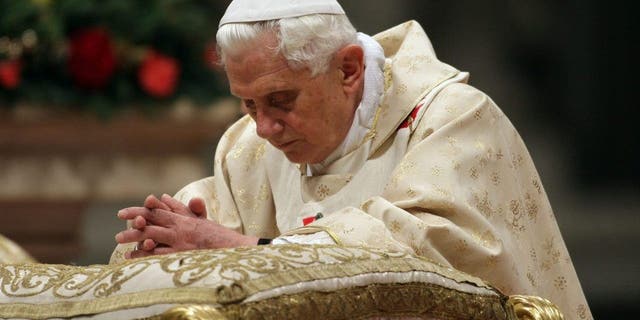
With the passing of Benedict, the Catholic Church loses one of its most prominent leaders born out of the Second Vatican Council.
And while the Church continues to shrink, grow and restructure as it has for centuries, Benedict’s lasting legacy provides guidance to many looking for a Catholic future full of authenticity and spirituality.
Read the full article Here


